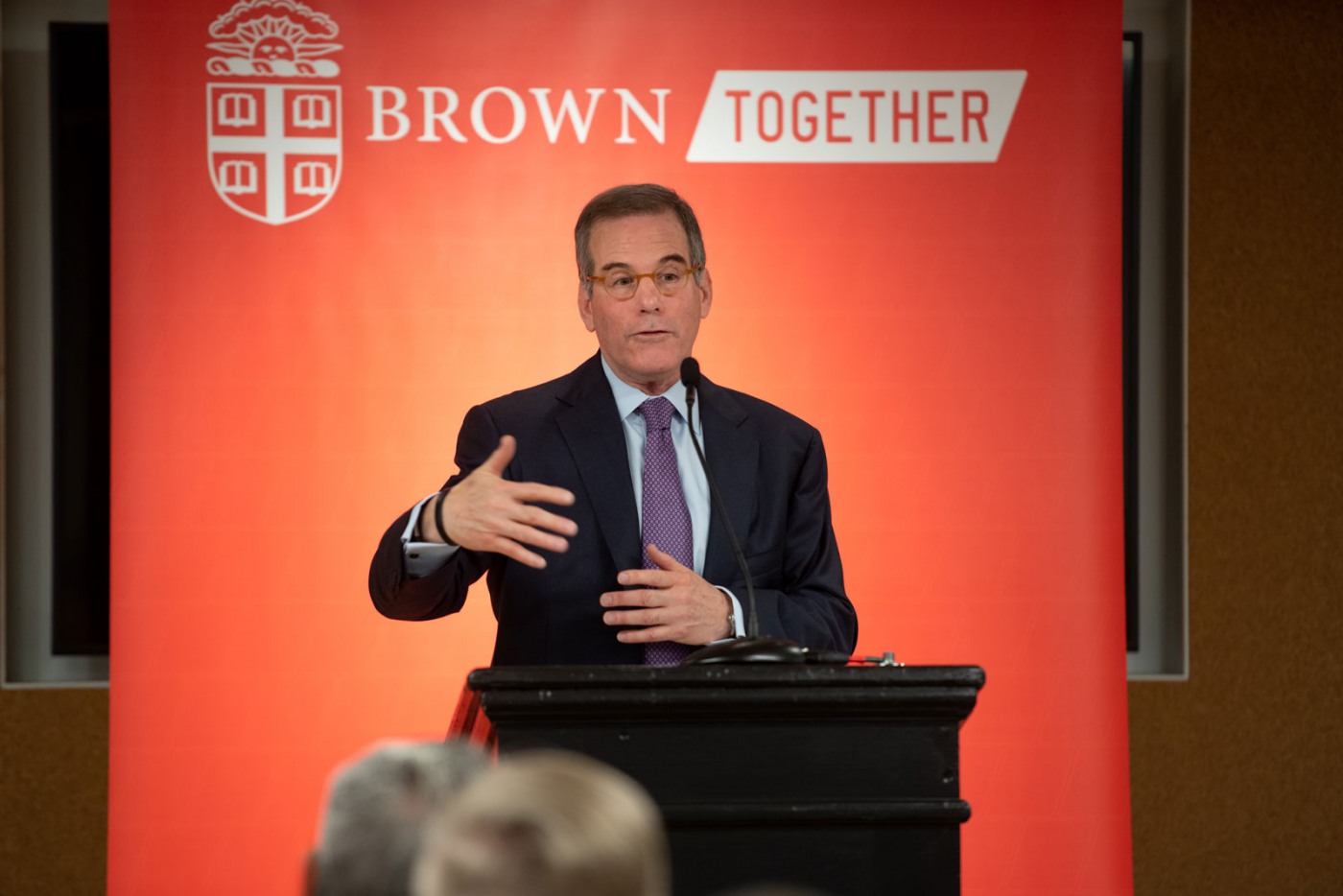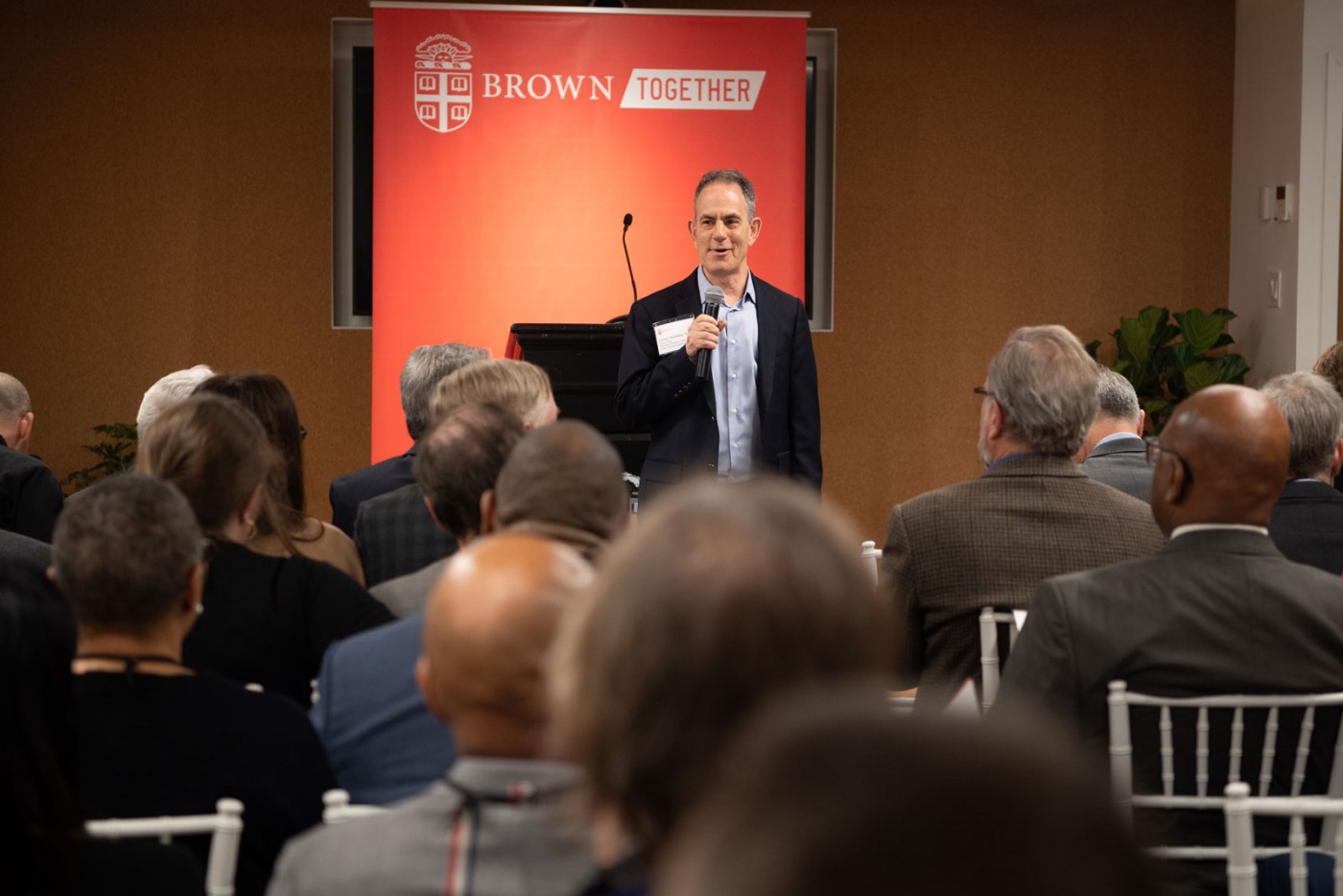PROVIDENCE, R.I. [Brown University] — Six months after opening the doors to a dedicated home for the Nelson Center for Entrepreneurship, senior leaders from Brown University joined members of the extended Brown entrepreneurship community to celebrate the new space on Friday, Oct. 25.
Located just steps from campus on three floors of a built-from-scratch building, the location at 1 Euclid Ave. now serves as physical hub for Brown’s diverse community of entrepreneurs affiliated with the Nelson Center.
At the Friday evening celebration, University President Christina H. Paxson highlighted a vision shared by students, faculty and staff at Brown and Jonathan M. Nelson — a Class of 1977 Brown alumnus and founder and CEO of Providence Equity Partners, who supported the center’s launch in 2016 with a $25 million gift — to make entrepreneurship a “signature program for Brown.”
There was a recognition, Paxson said, that entrepreneurship “could be something that would attract students to this University. And not just any students, but the kind of students we want to have come here — more of these creative, independent, innovative students.”
With the new Nelson Center space up and running, Paxson said, the University is in position to welcome those students more fully than ever. Before the move to the corner of Euclid Avenue and Thayer Street, in the heart of College Hill’s bustling retail district, the center operated temporarily from a third-floor suite in Brown-RISD Hillel. Now, it has three floors of its own.
The light-filled space is designed to be configurable to students’ needs and to foster “accidental collisions” — interactions between students from different backgrounds and interests who form new ideas. Tables, work spaces, couches, chairs — even the walls — can be moved as needed to create intimate meeting areas, co-working areas for student ventures or large lecture and event venues. Corkboards and glass whiteboards can be found nearly everywhere, usually crowded with brainstorms, equations and questions.

At the event, Jonathan Nelson described the new space as “Brown’s version of the proverbial ‘start-up garage.’”
He said that Brown’s culture of collaboration across disciplines and a student body primed for creative exploration by the Open Curriculum will serve as key ingredients to the center’s long-term success and impact.
“From the perspective of the student, the Open Curriculum creates freedom and minimal friction to move among departments,” Nelson said. “The consequence is a student body that heavily tilts toward experimentation and curiosity, and away from structure. That portends success for this center, because those are the same human qualities we see in our best entrepreneurs and entrepreneurial organizations. What a promising pool of next-gen founders is Brown.”
Already, in just three years since its launch, the Nelson Center is earning recognition for its work. Last month, associate director Jonas Clark traveled to Stockholm, where he accepted an award from the Global Consortium of Entrepreneurship Centers on the center’s behalf.
Among a wide range of nominees and five named finalists, the Nelson Center (along with Dartmouth College’s Magnuson Center for Entrepreneurship) took home the award for Outstanding Emerging Entrepreneurship Center. More than 300 representatives attended the conference from preeminent institutions across the globe.
It's not difficult to understand why the Nelson Center has received such accolades, speakers noted at Friday’s event. It has centralized funding opportunities for students exploring startup ventures; launched new courses on entrepreneurship; created a Peer Entrepreneurs-In-Residence program; facilitated Breakthrough Lab, Brown’s intensive summer student venture program; and hosted a diverse range of entrepreneurs and innovators as speakers.
Beyond that, the Nelson Center has shifted the idea that entrepreneurship is solely a means to launch ventures or rake in capital. By approaching entrepreneurship as a methodology for solving problems, Brown students, faculty and staff affiliated with the center are identifying and confronting issues of significant import to society.

“Because we define entrepreneurship from the liberal arts perspective — a structured process for solving problems — we are constantly attracting... new students from every corner of campus, every corner of the University, every discipline, every department, and every concentration,” said Danny Warshay, the center’s executive director. “They are students who, like many students at Brown, are eager to solve problems of consequence, and they are coming to learn the structured entrepreneurial process... and then to apply it to those significant problems.”
Warshay noted one student venture, EmboNet, that he said particularly embodies the Nelson Center’s ideals.
During heart surgery, plaques in the heart can break free and travel to the brain, causing strokes. EmboNet is a filter placed in the aorta that can catch those plaques before they do damage. The center’s venture support programs, including the Venture Prize program, supported the EmboNet team as the students took the idea from conception to proof of concept. Early benchtop testing found the device to be effective. The team has filed a provisional patent for its design, and the device won first prize in the Advanced Healthcare Systems track at the 2018 Johns Hopkins International Healthcare Design Competition.
“What is so cool… is the diverse composition of the EmboNet team — two biomedical engineering students, two Brown medical students... and a Rhode Island School of Design textiles student.”
Senior physical sciences writer Kevin Stacey contributed additional reporting to this article.